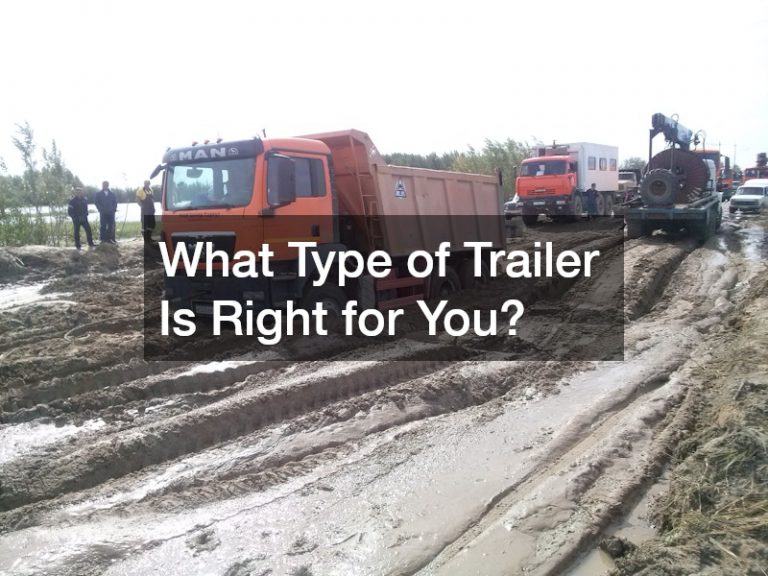Choosing the right trailer to meet your needs begins with understanding the varieties of trailers available on the market. There are numerous types of trailers, each designed for specific uses and applications. Whether you’re hauling equipment, livestock, or planning a road trip, the choice of trailer can make all the difference in your experience.
Among the various trailers, some popular categories include utility trailers, enclosed trailers, and flatbed trailers. Utility trailers are often used for transporting equipment like lawnmowers, motorcycles, and other small machinery.
Meanwhile, enclosed trailers provide added protection against the elements, making them ideal for transporting valuable cargo securely.
Flatbed trailers offer flexibility with their open design, making them suitable for carrying oversized loads. Although they don’t offer protection from weather, they are easy to load and unload, which can be a critical factor for hauling large items. Knowing the differences between these types helps narrow down your options, making your selection process simpler.
Defining Your Hauling Needs
Before deciding on a trailer, it’s essential to define your specific hauling needs clearly. Consider the types of loads you’ll be transporting most often, the frequency of use, and whether you’ll need to protect your cargo. Understanding these factors helps you determine which trailer features are must-haves and which are optional extras.
Additionally, think about the total weight of the loads you’ll be carrying, as this will affect the choice of axles and hitch. Safety should be a top priority, and selecting a trailer that can handle the weight of your haul is critical in preventing accidents and extending the life of your trailer. Moreover, consider the towing capacity of your vehicle to ensure it matches well with the trailer’s requirements.
Moreover, assessing your budget for both the initial purchase and long-term maintenance costs will significantly impact your choice. While some trailers may have a higher upfront cost, they may save money in the long run due to durability and lower maintenance needs. Researching the offerings from various trailer manufacturers can help you find a balance between features, price, and quality.
Considering Trailer Size and Capacity
When choosing a trailer, size and capacity are crucial components to consider. Your choice should be large enough to handle your needs but not so large that it becomes a burden to maneuver or store. The capacity of the trailer is equally important, as exceeding it can lead to dangerous towing situations.
Assess the dimensions of your typical loads to ensure that the trailer’s length and width will accommodate what you need to haul. Additionally, it’s wise to give yourself some leeway by choosing a trailer slightly larger than your current needs, allowing room for future growth or unexpected hauls. Confirm these dimensions with precision to avoid costly errors or modifications later on.
Weight capacity is another aspect that cannot be overlooked. It’s advisable to check the Gross Vehicle Weight Rating (GVWR) when evaluating capacity, ensuring the trailer can support the combined weight of the trailer’s structure and your cargo. Understanding the GVWR and pairing it correctly with your towing vehicle prolongs the lifespan of your investment and maximizes safety.
Weighing Customization Options
Once you’ve narrowed down your trailer type, size, and capacity needs, it’s time to consider customization options. Many trailer manufacturers offer customization to tailor the trailer to your specific requirements. This might include additional storage compartments, specialized loading ramps, or enhanced suspension for rough terrain.
Customization can transform a standard trailer into a specialized tool, which can significantly enhance its functionality and efficiency. However, it is important to balance customization with budget constraints and practical needs. Consult with a reputable trailer manufacturer to explore options that align with your workload demands and operational settings.
Remember, each customization carries additional costs, and overcomplicating the trailer can inflate maintenance issues down the line. It’s beneficial to engage in a thorough dialogue with your trailer manufacturer to achieve the perfect balance between bespoke features and essential functionality. Choose the modifications that will deliver the most value and ensure your trailer is equipped for success.
Selecting a Reputable Trailer Manufacturer
When investing in a trailer, selecting a reputable trailer manufacturer is just as important as choosing the correct type of trailer. A trustworthy manufacturer offers high-quality materials, reliable construction, and exemplary customer service. This ensures your trailer will be durable, safe, and serve your needs efficiently for years to come.
Research customer reviews, industry reputation, and the manufacturer’s warranty policies before reaching a final decision. Longer warranties typically reflect confidence in the quality of materials and workmanship. Moreover, consider the manufacturer’s aftermarket support for parts and services, as these will prove invaluable over the life of the trailer.
Building a relationship with a reliable trailer manufacturer can lead to long-term support, additional insights, and the opportunity for future trailer purchases. Confidence in your manufacturer’s capabilities enhances peace of mind, knowing you’ve invested wisely in a product that won’t let you down. Whether for personal or business use, the right trailer from the right manufacturer can transform your hauling operations, ensuring efficiency and peace of mind.
.





